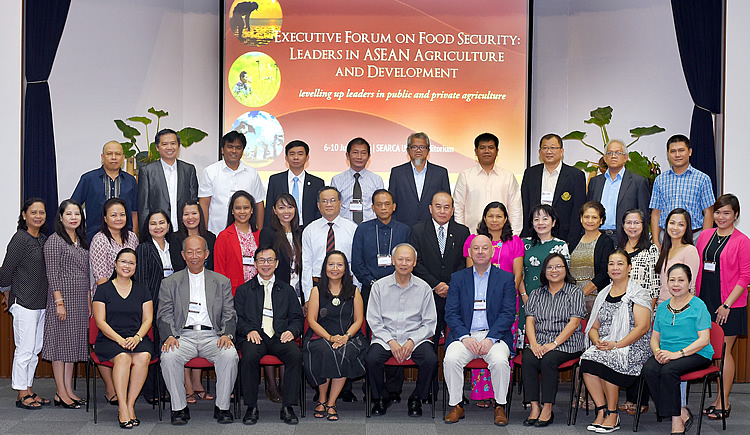The five-day learning event aims to build a community of ASEAN leaders in agriculture who are empowered with knowledge on key contemporary issues in agriculture and food security. It focuses on the role of agriculture in relation to four commonly expressed government goals: developing sustainable rural development, conserving natural resources in the environment, achieving competitive agricultural exports, and ensuring food security for rural and urban populations.
In his welcome remarks read for him during the opening program, Dr. Gil C. Saguiguit, Jr. SEARCA director, said thatpathways toward food security have never been easy as we are constantly faced by challenges of an ever increasing population, dwindling natural resource base, and worsening climatic conditions that all negatively affect the region’s agriculture sector. These varied and persistent problems in the region coupled with the changing ASEAN agricultural landscape demands leaders and executives that the executive forum participants represent to rise above the occasion and make appropriate multilateral decisions and actions, he said.
The executive forum therefore includes lectures on leadership and learning syndicates. It is divided into three modules: (1) New Elements in the Agriculture-Development Landscape; (2) The ASEAN Landscape for Agriculture vis-à-vis the Global Agriculture Landscape; and (3) New Leadership Modes. Through this executive forum, SEARCA hopes to equip agricultural and rural development leaders with the necessary skills and knowledge to take on the challenges in a changing agricultural landscape.
SEARCA Senior Fellow Dr. Paul S. Teng of the National Institute of Education (NIE) at the Nanyang Technological University (NTU) leads the high-calibre resource persons of the forum as its technical coordinator. Other resource speakers include Dr. David Ng Foo Seong, Associate Professor at NTU NIE; Dr. Andrew Powell, Chief Executive Officer of AsiaBioBusiness, Pte. Ltd. Singapore; Dr. Rodel D. Lasco, Philippine Coordinator of the World Agroforestry Center (ICRAF) and Scientific Director of Oscar M. Lopez (OML) Center; Dr. Rolando T. Dy, Full Professor and Executive Director of the Center for Food and Agribusiness at the University of Asia and the Pacific; Dr. Rhodora R. Aldemita, Senior Program Officer of the International Service for the Acquisition of Agri-biotech Applications (ISAAA); Dr. Noel Magor, Head of Unit Impact Acceleration and Training Center of the International Rice Research Institute (IRRI); Dr. Larry Chee-Yoong Wong, Visiting Fellow at the Institute of Strategic and International Studies (ISIS) Malaysia and Senior Advisor of Myanmar Rice Federation; Ms. SoMang Yang, Senior Manager for Advocacy of CropLife Asia; Dr. Bas Bouman, Director of the Global Rice Science Partnership (GRiSP) at IRRI; Mr. Martin Bettelley, Country Deputy Director of World Food Programme – Philippines; and Ms. Alison Eskesen, Director of Knowledge and Innovation of Grow Asia.
Participants in the forum come from academic institutions and agriculture ministries in Cambodia, Indonesia, Lao PDR, Malaysia, Myanmar, Philippines, Thailand, and Vietnam. (Evelie P. Serrano)
